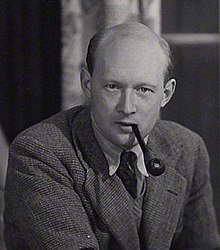C. H. Waddington
| Conrad Hal Waddington | |
|---|---|

Conrad Hal Waddington, FRS, FRSE
|
|
| Born | 8 November 1905 Evesham, Worcestershire, England |
| Died |
26 September 1975 (aged 69) Edinburgh, Scotland |
| Nationality | British |
| Fields | Developmental biology, genetics, paleontology |
| Institutions |
University of Cambridge, Christ's College University of Edinburgh Wesleyan University Centre for Human Ecology |
| Alma mater | University of Cambridge |
| Known for | Epigenetic landscape, canalisation, homeorhesis, genetic assimilation, chreod |
| Influences | Alfred North Whitehead |
| Influenced | Jean Piaget, Sanford Kwinter, Gregory Bateson, Margaret Mead |
Conrad Hal Waddington CBE FRS FRSE (8 November 1905 – 26 September 1975) was a British developmental biologist, paleontologist, geneticist, embryologist and philosopher who laid the foundations for systems biology, epigenetics, and evolutionary developmental biology.
Although his theory of genetic assimilation had a Darwinian explanation, leading evolutionary biologists including Theodosius Dobzhansky and Ernst Mayr considered that Waddington was using genetic assimilation to support so-called Lamarckian inheritance, the acquisition of inherited characteristics through the effects of the environment during an organism's lifetime.
Waddington had wide interests that included poetry and painting, as well as left-wing political leanings. In his book The Scientific Attitude (1941), he touched on political topics such as central planning, and praised Marxism as a "profound scientific philosophy".
Waddington, known as "Wad" to his friends and "Con" to family, was born to Hal and Mary Ellen (Warner) Waddington, 8 November 1905. Until nearly three years of age, Waddington lived with his parents in India, where his father worked on a tea estate in the Wayanad district of Kerala. In 1910, at the age of four, he was sent to live with family in England including his aunt, uncle, and Quaker grandmother. His parents remained in India until 1928. During his childhood, he was particularly attached to a local druggist and distant relation, Dr. Doeg. Doeg, whom Waddington called "Grandpa", introduced Waddington to a wide range of sciences from chemistry to geology. During the year following the completion of his entrance exams to university, Waddington received an intense course in chemistry from E. J. Holmyard. Aside from being "something of a genius of a [chemistry] teacher," Holmyard introduced Waddington to the "Alexandrian Gnostics" and the "Arabic Alchemists." From these lessons in metaphysics, Waddington first gained an appreciation for interconnected holistic systems. Waddington reflected that this early education prepared him for Alfred North Whitehead's philosophy in the 1920s and 30s and the cybernetics of Norbert Wiener and others in the 1940s.
...
Wikipedia
